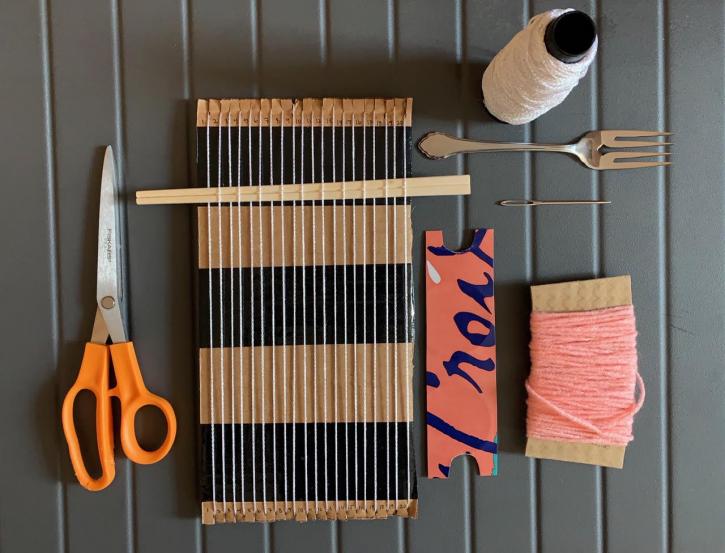
When the pandemic began to hit Chicago, faculty member Danielle Andress made the same move as many of her students: she went to Alabama to stay in her parents’ house. Andress lives in a high-rise in Hyde Park, and with an elderly dog, her family’s frequent trips up and down the elevator were constantly putting their health at risk. Andress is an assistant professor of Fiber and Material Studies and also a practicing artist. “I packed what I needed to successfully teach and what I needed to be productive with my practice,” she said. “And moved back home.”
One thing she couldn’t travel with: a standard floor loom, like the ones she uses at the School. Essential to the work of Andress and her students, she began to research how to make one from common household materials. “The first assignment I had my students do was upload a video diary entry to talk about what their lives were like in the weeks we’d been separated,” Andress said. “I asked them where they are, how they’re feeling, and what they have access to.” These submissions helped Andress not only understand how her students were emotionally, but what materials they had to continue their work.
After successfully building a desktop-sized loom made from cardboard boxes, duct tape, a coffee cup sleeve, and chopsticks, she shared her construction with her students. To give them additional inspiration, she also sent YouTube tutorials on weaving using chair rungs and shared advice from one of her former teaching assistants, Danielle Lasker, a current MFA candidate, who had created a home loom out of nails. She also asked another MFA candidate, Sage Mtahta, to make a presentation on weaving inspiration. “I wanted to show students that you can make this work with anything, and it’s actually responsible to be mindful of not putting strains on supply lines and essential workers, when you can use chopsticks or the back of your chair to get your work done,” Andress said.
With Andress as a guide, students showed true resourcefulness, building looms out of stripped bicycle wheels and wooden crates. Rapid skill building is essential to her Introduction to Fiber and Materials Studies class, and with these looms students were able to continue their progress in learning weaving techniques. Andress also showed them how to pull yarn from old sweaters, and source other materials at a time when access to weaving supplies is limited. “Students were able to learn this other strategy for sustainability,” Andress said. “Which is something we’re really trying to stress as a department.”
Now armed with their own homemade looms, Andress has been working to recreate the sort of community the weaving studios foster. “The studios are an intimate, chatty place, and students really miss that,” she said. Every week, in addition to instruction, she hosts time on Zoom where students weave together. They talk about what’s going on in their lives, work through technical questions, and share their works in progress. “Weaving is naturally a very meditative, therapeutic process,” Andress said. “These spaces have really helpful, and my students are so resilient. Together, we’re rebuilding our community.”
Actual Article Link: https://www.saic.edu/news/weaving-together-how-faculty-member-danielle-andress%E2%80%99-homemade-looms-teach-technique-and-build
News Taken: SAIC News
Photo Taken: SAIC News Page